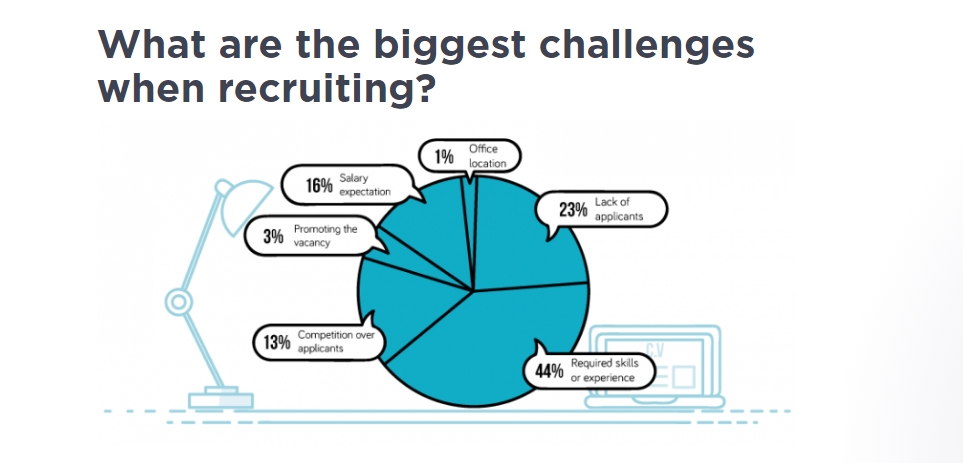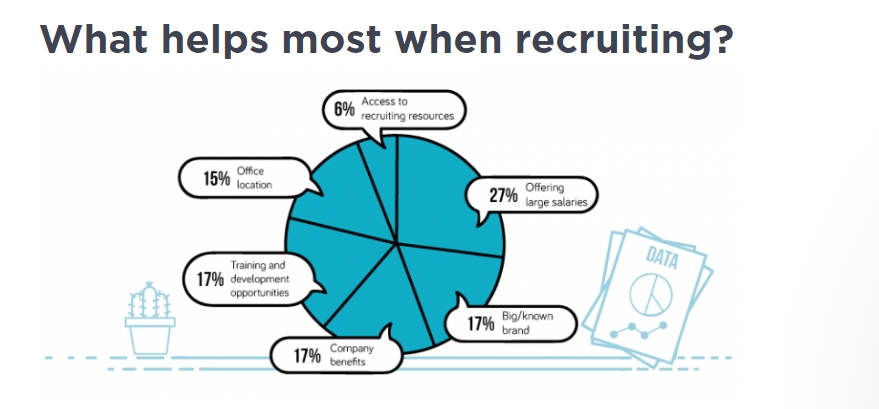
Recruitment brings a whole host of problems for businesses, not least of all because it can be a highly time consuming process that doesn't always end with the desired hire. Onrec recently reported that SMEs spend £2.9bn on interim recruitment alone. What's more, it was also reported that HR professionals lose “three-and-a-half days (27 hours) every time they recruit a new interim team member”.
The time HR departments spend on finding the right hire is only valuable if indeed the right hire is discovered, but all too often recruiters struggle to find the correct candidate.
A survey conducted by FordeHRCloud found that there were many struggles facing HR when it came to recruitment, most notably 44% naming a lack of relevant skills being the primary difficulty encountered. Overall, a whopping 69% of people who responded said that they found recruitment to be a tough process.

Unsurprisingly, this survey also found that the biggest help when it came to recruiting came about from offering large salaries (27%).

Recruitment for both big companies and SMEs alike is difficult, but you can help yourself in making sure you get the right hire for the job.
Consider Alternatives

Depending on the role you are trying to fill, it may be worth considering if there are alternative options, especially if this role is only interim. If the vacancy is a phone based role or you're in need of a temporary receptionist, then you would be much better placed utilising a service. Rather than worry about who you're getting and whether the interim nature of the role will be off-putting, you'll have a professional individual tailored to meet your company needs for any duration that suits the business. Companies, especially SMEs, are more and more turning to these alternative options rather than going through the sometimes unrewarding process of recruitment.
Allow Your Current Staff to Have a Say
This is especially true if you're a smaller business. Skill sets rarely come neatly packaged and what a candidate doesn't know can often be learnt along the way, whereas their compatibility with the rest of the team is something that can't be manufactured. How well your team gets along is fundamental to how well your business runs and so it's always a good idea to let your current staff have an opportunity to meet the potential new starter and give their opinion. You don't have to listen, but two heads are often better than one when it comes to judging a character in a small space of time.
Don't Hold Out For Perfect
As with dating, you will rarely find 'the one' out there. Holding out for a candidate who ticks each and every of the twenty boxes you have outlined means you may well miss out on a goldmine of real talent. If a candidate has almost everything but you find it off-putting that they're moving from a larger company to potentially your own-don't be! Similarly, if they could have been perfect if they'd only had that additional years experience-interview them! You might get lucky and find someone who's the whole package, but more often than not holding out for it can blind-side you to a really great person.
Recruitment's Tough
Big or small, every company struggles with recruitment, which is why talking to your fellow colleagues and keeping up to date with the latest news is fundamental in not becoming overwhelmed. Considering alternatives where possible and listening to both your gut and your staff can both be positive ways in making sure you get the right hire.
Categories
- 24 Hour Call Answering Service (6)
- After Hours Call Answering (5)
- After-Hours Call Answering Service (6)
- Answer-4u (11)
- Artificial Intelligence (5)
- BPO (5)
- Business (66)
- Business Grants (3)
- Business Growth (4)
- Business Owner (6)
- Business Strategy (2)
- Call Diversion (6)
- Call Handling Service (13)
- Charity (2)
- Christmas (6)
- Customer Experience (5)
- Customer Satisfaction (3)
- Customer Service (26)
- Customer Services (8)
- Decision Making (3)
- Diary Management (3)
- Digital Marketing (16)
- Disaster Recovery (5)
- EntrepPhase (7)
- Entrepreneurs (7)
- Finance (2)
- Funding (3)
- HR (6)
- Infographic (1)
- Inspiration (2)
- Leadership (4)
- Marketing (15)
- Marketing Strategy (2)
- Networking (2)
- Other (4)
- Outsourcing (14)
- Phone Etiquette (9)
- Productivity (6)
- Property Management (3)
- Recruitment (7)
- Self Improvement (2)
- Small Business (14)
- SME (4)
- Staff Training (2)
- Start-Up (9)
- Technology (3)
- Telephone Answering (15)
- Time Management (4)
- Virtual Assistant (3)
- Virtual Receptionist (12)
- Workforce (9)
- Working Environment (9)
- Workplace (28)





